Prices for travel during the COVID-19 pandemic: is there commonality across countries and items?
Published as part of the ECB Economic Bulletin, Issue 1/2021.
Inflation for travel-related items has plummeted in the euro area during the coronavirus (COVID-19) pandemic. Services inflation in general has deteriorated recently reaching a trough in October 2020. The main driver behind the decline has been the strong drop in inflation for travel-related services (here referring to package holidays, accommodation services, and passenger transport by air), despite its relatively moderate weight in HICP services (Chart A).[1] This likely reflects the nature of the containment and lockdown measures taken across the euro area.[2] Given that the impact of lockdown measures on inflation has been particularly visible in those countries that are heavily exposed to tourism[3], this box analyses the potential commonalities in travel-related items affected by COVID-19 lockdowns pulling down services inflation across the euro area countries.
Chart A
Developments in services inflation and services inflation excluding travel-related items
(annual percentage changes)
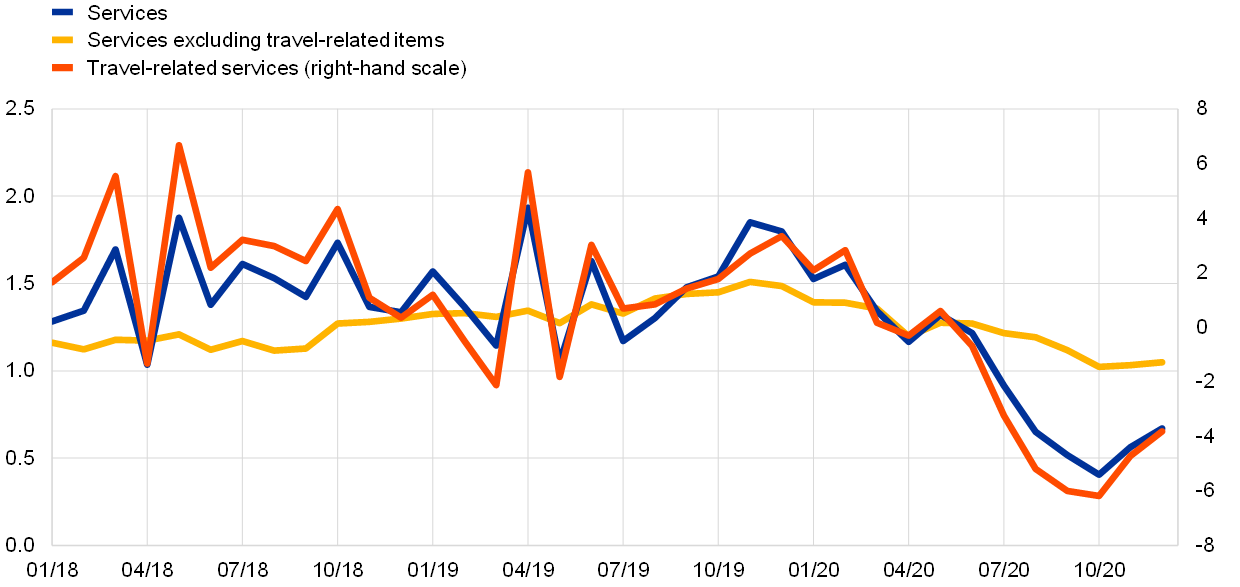
Sources: Eurostat and ECB calculations.
Notes: Travel-related items include (i) package holidays, (ii) accommodation services, and (iii) passenger transport by air.
The decline in travel-related services inflation in the euro area is broad-based across its included items (i.e. package holidays, accommodation and passenger transport by air).[4] The drop in inflation rates for passenger transport by air contributed most to the overall decline (about 45%) followed by accommodation services, while package holidays contributed the least to the decline (Chart B, panel a).[5] Usually, travel-related service items show high seasonality, reaching a price-level peak during the summer months. In 2020, the price levels for accommodation services and passenger transport by air (vis-à-vis January) have, since the summer, been below their relative average levels of previous years, and substantially lower than the price levels observed in 2019 (Chart B, panel b). Furthermore, the strong seasonal upward impact on price levels for passenger transport by air, which usually occurs in the summer months, was more muted in summer 2020. Taken together, this implies that the price level for accommodation services and passenger transport by air has been lower since the pandemic started.
Chart B
Drivers of travel-related services inflation
(panel a: annual percentage changes, percentage point contributions with respect to February 2020; panel b: index January=100)
Contributions
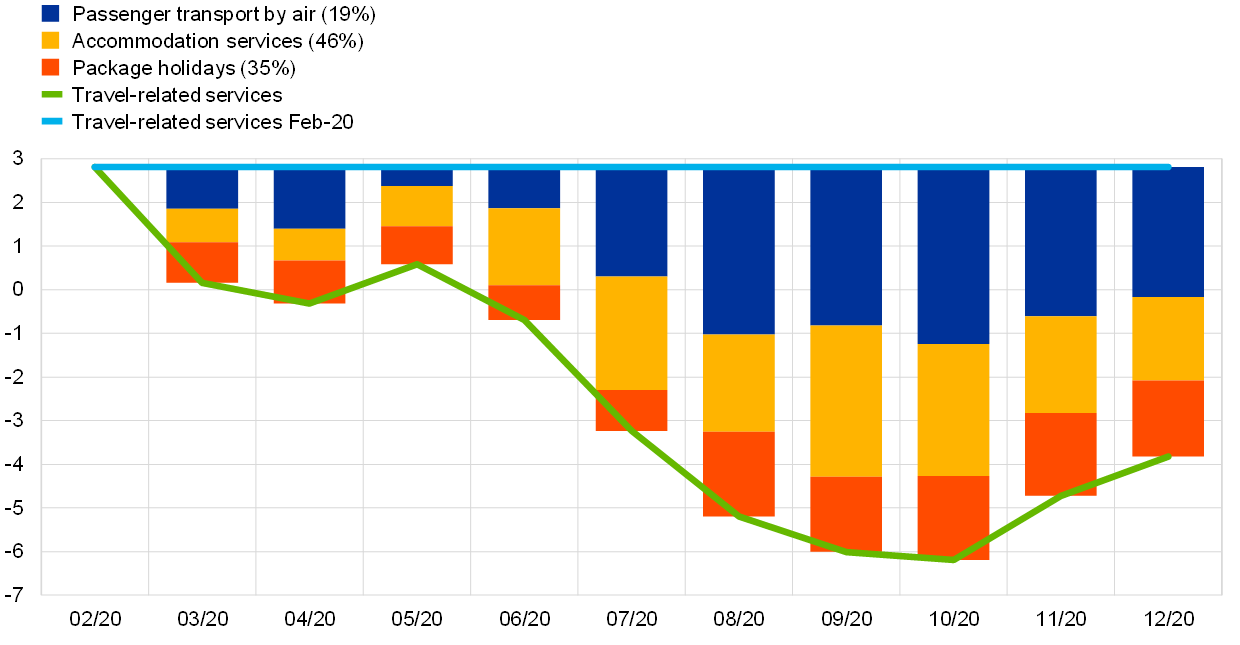
Seasonality
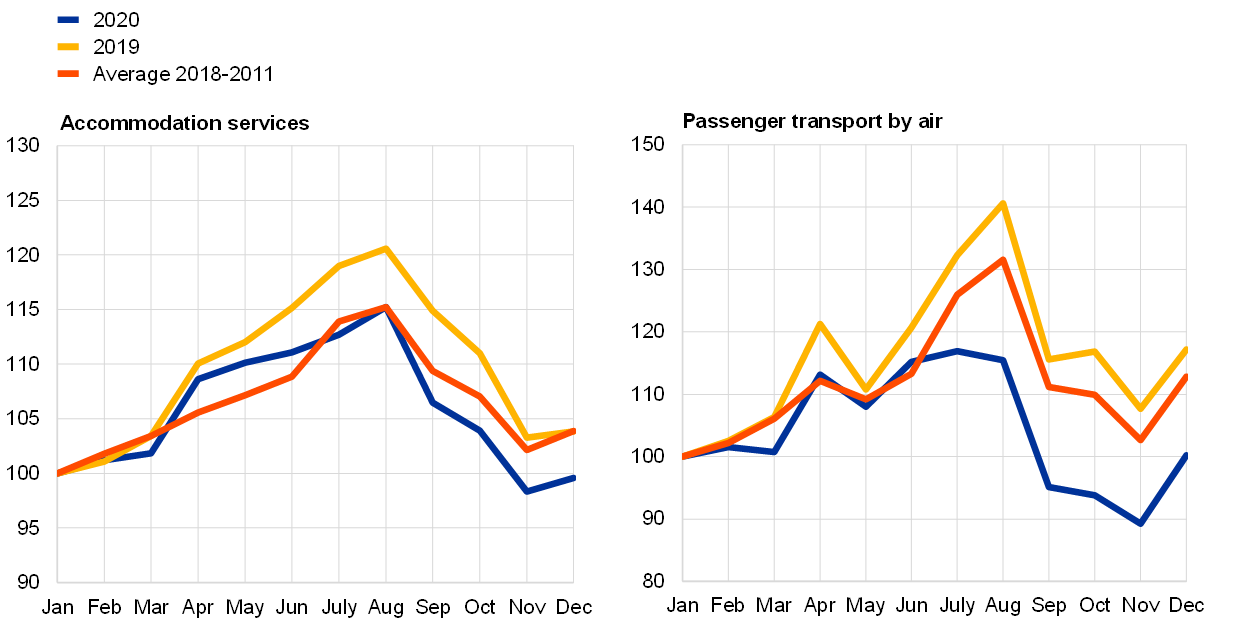
Sources: Eurostat and ECB calculations.
Notes: The weights for package holidays, accommodation services, and passenger transport by air in travel-related services shown in brackets in panel a. The bars in panel a refer to cumulative contributions to the change in HICP travel-related services inflation since February 2020, and the horizontal line refers to HICP travel-related services at that date.
The international component of travel-related services has been the main driver of the historical contraction in inflation for travel-related services overall (Chart C). This is amplified for both package holidays and passenger transport by air because the weight of the international component[6] amounts to around 85% for the euro area.[7] In comparison, domestic tourism remained relative resilient in many euro area countries and the decline in the annual rates of change for prices of domestic holidays and flights was milder.[8]
Chart C
Inflation of domestic and international components of package holidays and passenger transport by air
(annual percentage changes, percentage point contributions with respect to February 2020)
Package holidays
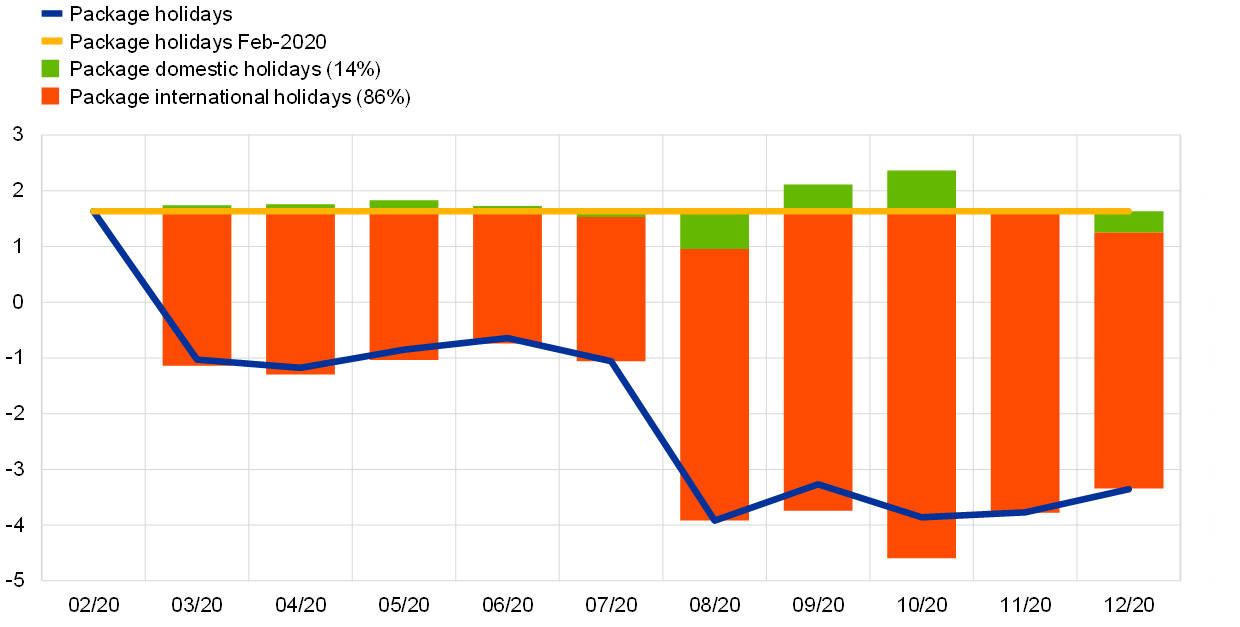
Passenger transport by air
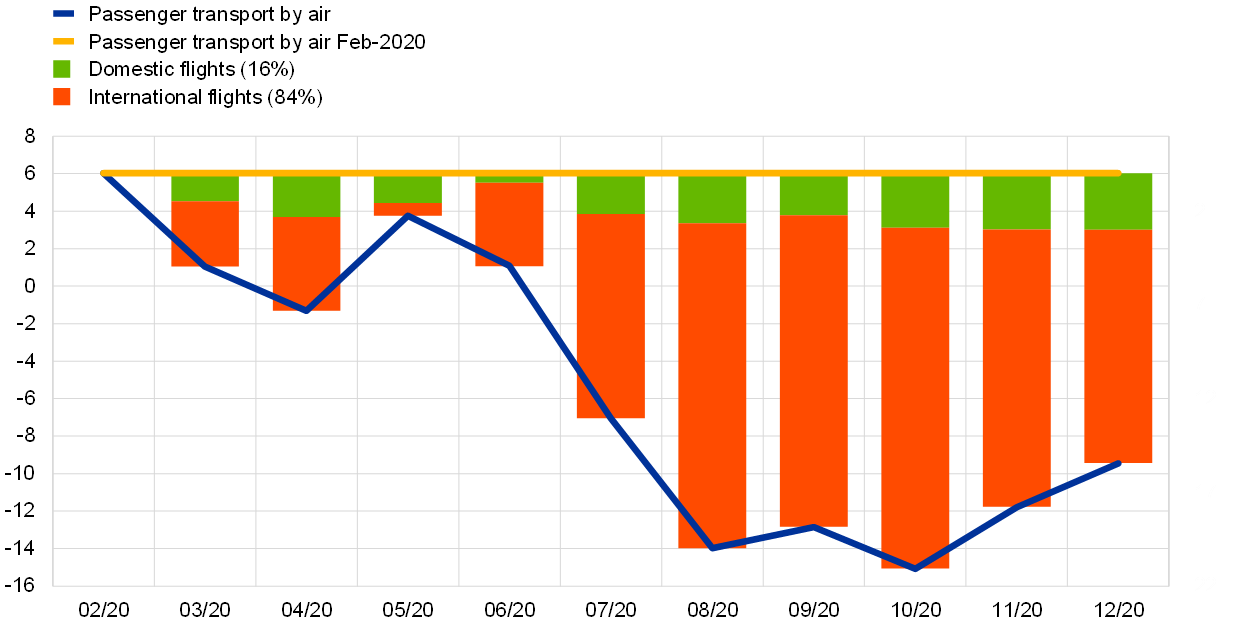
Sources: Eurostat and ECB calculations.
Notes: The weights of the domestic and international components of both package holidays and passenger transport by air are shown in brackets.
During the initial lockdowns in the second quarter of 2020, the pass through to prices in travel-related services lagged.[9] There are various reasons for the initial persistence in travel-related inflation. First, social distancing and direct restrictions on mobility (and/or indirectly via quarantine requirements) implied that even if firms had reduced prices, demand was likely to remain low or absent. Second, firms may have preferred to delay price changes until restrictions were lifted to avoid additional menu costs. Third, published price indices in the second quarter of 2020 were based on elevated degrees of price imputation and thus may not have captured the underlying negative economic impact during that period.[10] Instead, inflation rates generally reflected developments in past data from 2019. Once these effects faded, weak demand came more clearly to the fore in the third quarter of 2020.[11]
The recent upward movement in inflation rates for travel-related services may be affected by a renewed increase in imputation rates. Many euro area countries recently re-imposed strict lockdown measures, which caused imputation shares to rise. In the fourth quarter of 2020 the imputed prices were concentrated in the services sector with an imputation share of around 20% for the euro area. During that quarter the indices for package holidays and accommodation services in the euro area were flagged as unreliable.[12] Similar to the lockdown during the second quarter in 2020, imputed prices and postponement of price reviews by firms might not reflect the actual price pressures.
All euro area countries have experienced a decline in travel-related services inflation compared to their pre-pandemic levels (Chart D). However, there is some country heterogeneity related to both the magnitude of the decrease and the main contributing items. By and large, countries which are usually net exporters of travel services also showed the largest drop in travel-related services inflation compared to February 2020.[13] The most common contributing item to the sharp decline in travel-related services inflation across countries is prices for passenger transport by air. While inflation for accommodation services also contributed heavily in many southern European countries, package holidays have been a major source of the decline in Germany[14] and the Netherlands.[15]
Chart D
Developments in travel-related services inflation across euro area countries
(changes with respect to February 2020, percentage point contributions)

Sources: Eurostat and ECB calculations.
Looking ahead, uncertainty around the outlook for inflation in travel-related services has increased. While lockdown measures have been gradually re-imposed, vaccination campaigns have started across the euro area. If lockdowns become tighter, imputation shares are likely to increase for travel-related items. Firms might hold back on price changes as demand is rather inelastic to price changes in the current circumstances. These factors may hamper the interpretation of actual price pressures. Once lockdown restrictions are lifted again, the normal interplay of price adjustments by firms will be resumed but their size and nature will depend on the prevailing demand and supply conditions. By and large, the outlook for travel-related services inflation remains uncertain as both upside and downside risks may materialise depending on the progression of the COVID-19 pandemic.
- Package holiday prices are recorded in the country where the trip starts, although the largest part of the underlying service may be provided in the travel destination. The price of the package holiday is still likely to reflect price developments for accommodation, restaurants and other similar services in the travel destination.
- It should be kept in mind that the lockdowns have led to large changes in consumer spending patterns that have not been reflected so far in official inflation statistics. For a detailed discussion of pandemic-induced changes in household consumption and their implications for inflation see the box entitled “Consumption patterns and inflation measurement issues during the COVID-19 pandemic”, Economic Bulletin, Issue 7, ECB, 2020.
- See the box entitled “Developments in the tourism sector during the COVID-19 pandemic”, Economic Bulletin, Issue 8, ECB, 2020.
- In 2020 the travel-related services amounted to approximately 10% of the weight in euro area services HICP.
- From February 2020 inflation for passenger transport dropped by about 20 percentage points, reaching a trough in October 2020. In the same period, inflation for accommodation services fell by about 7.5 percentage points, reaching a trough in September 2020. Similarly, inflation for package holidays dropped by about 5.5 percentage points, reaching a trough in August 2020.
- Prices for international flights includes flights between euro area countries and flights to countries outside the euro area. Domestic flights cover only flights within a euro area country.
- For accommodation services, a more granular breakdown would include (i) hotels, motels, inns and similar accommodation services, (ii) holiday centres, camping sites, youth hostels and similar accommodation services, as well as (iii) accommodation services of other establishments. Such a breakdown does not distinguish between domestic and other guests.
- The decline in inflation for domestic flights amounted to about 10 percentage points between February and July 2020, whereas it was about 20 percentage points for international flights. Inflation rates of domestic package holidays observed a dip in July and August 2020, but they stayed relatively resilient before and thereafter.
- See the article entitled “The role of demand and supply factors in HICP inflation during the COVID-19 pandemic – a disaggregated perspective”, in this issue of the Economic Bulletin.
- For services in general the imputation share reached above 40% in April 2020 for the euro area as whole. In some euro area countries imputation shares were higher and for some travel-related services they even reached 100%.
- Notwithstanding a decline in imputation rates in the third quarter of 2020, some countries had imputed rates for travel-related services items. For example, when looking at the large euro area countries, passenger transport prices were imputed in Germany throughout the third quarter of 2020 and in Italy in July and August 2020.
- Passenger transport by air has been flagged as unreliable in some EU Member States but not at the euro area level.
- See the box entitled “Developments in the tourism sector during the COVID-19 pandemic”, Economic Bulletin, Issue 8, ECB, 2020.
- In Germany some of the impact is also due to the German VAT rate cut in July 2020.
- Methodologically, the item package holidays has a prominent weight, mainly in Germany, Spain and the Netherlands, when considering the five largest euro area countries.


